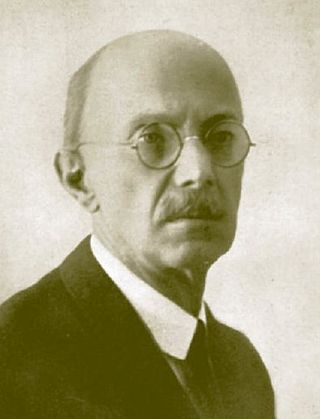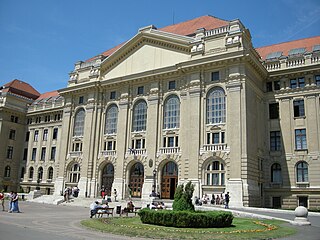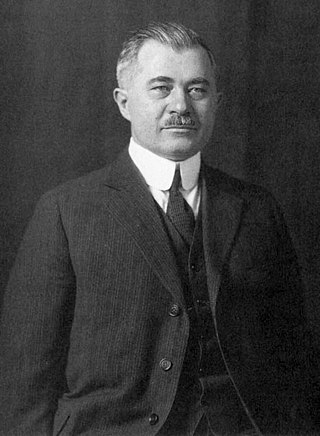
Kálmán Kandó de Egerfarmos et Sztregova was a Hungarian engineer, the inventor of phase converter and a pioneer in the development of AC electric railway traction.

The Ganz Machinery Works Holding is a Hungarian holding company. Its products are related to rail transport, power generation, and water supply, among other industries.

The Budapest University of Technology and Economics, official abbreviation BME, is a public research university located in Budapest, Hungary. It is the most significant university of technology in the country and is considered the world's oldest institute of technology which has university rank and structure. It was founded in 1782.

The University of Debrecen is a university located in Debrecen, Hungary. It is the oldest continuously operating institution of higher education in Hungary ever since its establishment in 1538. The university has a well established programme in the English language for international students, particularly in the Medical and Engineering field, which first established education in English in 1886. There are nearly 6000 international students studying at the university.

Farkasréti Cemetery or Farkasrét Cemetery is one of the most famous cemeteries in Budapest. It opened in 1894 and is noted for its extensive views of the city.

József Galamb was a Hungarian mechanical engineer, most known as main-engineer for designing the Ford Model T.

The University of Pannonia is a university with its main campus in Veszprém, Hungary. It was founded in 1949 and is organized in four faculties: Humanities, Engineering, Economics, and Informatics. Before 2006, it was named University of Veszprém.

Science and technology is one of Hungary's most developed sectors. The country spent 1.4% of its gross domestic product (GDP) on civil research and development in 2015, which is the 25th-highest ratio in the world. Hungary ranks 32nd among the most innovative countries in the Bloomberg Innovation Index, standing before Hong Kong, Iceland or Malta. Hungary was ranked 36th in the Global Innovation Index in 2024.

Kodolányi János University is a private higher education institution in Hungary with its main campus in Budapest. It has regional campuses in Székesfehérvár and Orosháza. According to its mission statement, the university is dedicated to fostering moral citizenship and promoting local identities. KJU is among the earliest private higher education institutions created in Hungary following the collapse of the communist regime.

László Verebélÿ was a Hungarian university professor and electrical engineer. He worked in Hungary, Italy, Germany, Austria, England and the United States and did important work on the development of Hungary's electricity network after World War I.

Péter Márki-Zay, often referred to by his initials MZP, is a Hungarian politician, marketer, economist, electrical engineer and historian. He has served as mayor of Hódmezővásárhely since 2018, and is the co-founder of the Everybody's Hungary Movement. As the winner of the 2021 opposition primary, he was the candidate of the United for Hungary challenging Prime Minister Viktor Orbán in the 2022 parliamentary election, which he lost.

An opposition primary was held in Hungary, between 18–28 September 2021 and 10–16 October 2021, to select the candidate for Prime Minister of Hungary supported by the opposition parties to form a coalition to compete in the 2022 parliamentary election. It was the first countrywide primary election in the political history of Hungary. The parties had also selected common candidates for single-member districts via the primary.

László Palkovics is a Hungarian politician. He served as Minister for Innovation and Technology from 18 May 2018 to 24 May 2022, then as Minister of Technology and Industry since 24 May 2022 in the fourth and fifth cabinets of Viktor Orbán, respectively. Previously he functioned Secretary of State for Higher Education from 2014 to 2016 and Secretary of State for Education from 2016 to 2018 within the Ministry of Human Resources under minister Zoltán Balog, in the Third Orbán Government.

The Faculty of Science of Eötvös Loránd University was founded in 1949 and it is located in Lágymányos Campus, Újbuda, Budapest, Hungary.

The Faculty of Law of Eötvös Loránd University was founded in 1667 and it is located in Egyetem tér in Belváros-Lipótváros, Budapest, Hungary.

Singing Makes Life Beautiful is a 1950 Hungarian musical comedy film directed by Márton Keleti and starring Imre Soós, Violetta Ferrari and Ferenc Ladányi. It was shot at the Hunnia Studios in Budapest. The film's sets were designed by the art director József Pán.

Antal K. Bejczy was a Hungarian scientist and a national of the United States known for his contributions to the field of robotic human–machine interfaces, particularly in enhancing automation. He served as an Affiliate Professor in Systems Science and Mathematics at Washington University.


















